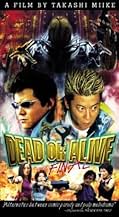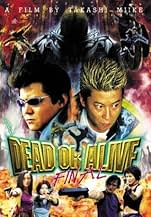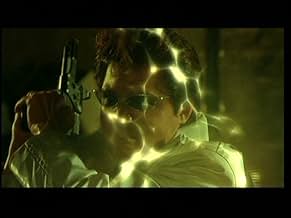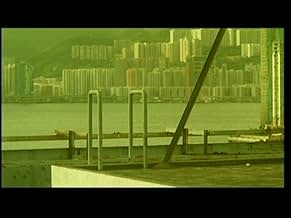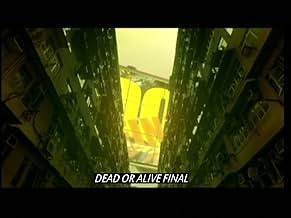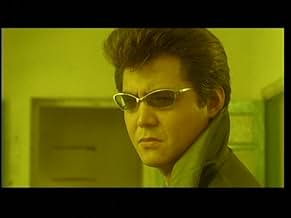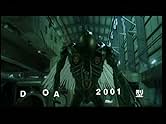VALUTAZIONE IMDb
5,6/10
2932
LA TUA VALUTAZIONE
Aggiungi una trama nella tua linguaThe ace cop of a totalitarian police force and a drifting android play their parts in a post-apocalyptic society. They are destined to fight. Their encounter will change them forever.The ace cop of a totalitarian police force and a drifting android play their parts in a post-apocalyptic society. They are destined to fight. Their encounter will change them forever.The ace cop of a totalitarian police force and a drifting android play their parts in a post-apocalyptic society. They are destined to fight. Their encounter will change them forever.
- Regia
- Sceneggiatura
- Star
William Wai-Lun Duen
- Gangster
- (as William Duan)
Wai-Kwong Lo
- Gangster
- (as Kenneth Low)
Don Thai Theerathada
- Don
- (as Donald Panutat)
Recensioni in evidenza
This was a surprise - I was expecting something along the lines of the original DOA, not having seen any of the sequels. What you actually get is a slowish, rather beautiful, enigmatic science fiction film, rather like a Philip K Dick novel in that its central themes are love and the problem of how to be human in a mechanical world.
The film borrows the notion of 'replicants' from Blade Runner (I can't remember if they were called that in PKD's source novel) but takes the idea further than that highly over-rated film, bringing us characters who don't realise that they're replicants battling replicants who are becoming human, ending with a strange metal-morphosis straight out of 'Tetsuo'. The story moves along smoothly but never really kicks into high gear. We're in 2346, in Yokohama, where the gay Mayor Wu has made the consumption of a birth control drug that destroys love a compulsory act. Babies born due to defiance of the law are destoyed, Herod-style. Riki Takeuchi (who is getting a bit porky these days!) is Wu's enforcer.
Puzzlingly, he has a small son. He goes into action against some revolutionaries and has all of his most cherished illusions destroyed...
Visually, the film is quite lovely, even though it seems to have been made (as per usual with Takashi) very speedily. It also seems to have been shot on some kind of video process, which doesn't hold up well on the big screen but won't bother anybody watching it at home.
The ending is unfathomable even by Takashi's standards, and rather abrupt. Still, there's nobody else like him...
The film borrows the notion of 'replicants' from Blade Runner (I can't remember if they were called that in PKD's source novel) but takes the idea further than that highly over-rated film, bringing us characters who don't realise that they're replicants battling replicants who are becoming human, ending with a strange metal-morphosis straight out of 'Tetsuo'. The story moves along smoothly but never really kicks into high gear. We're in 2346, in Yokohama, where the gay Mayor Wu has made the consumption of a birth control drug that destroys love a compulsory act. Babies born due to defiance of the law are destoyed, Herod-style. Riki Takeuchi (who is getting a bit porky these days!) is Wu's enforcer.
Puzzlingly, he has a small son. He goes into action against some revolutionaries and has all of his most cherished illusions destroyed...
Visually, the film is quite lovely, even though it seems to have been made (as per usual with Takashi) very speedily. It also seems to have been shot on some kind of video process, which doesn't hold up well on the big screen but won't bother anybody watching it at home.
The ending is unfathomable even by Takashi's standards, and rather abrupt. Still, there's nobody else like him...
I guess it's for the best that this Dead or Alive is the final one, because it's not great. Though to be honest, I feel like this whole trilogy is one where only a single film is good. I didn't love the first one, dug the second, and then found this third one a bit tedious.
I thought it would have a little something going for it thanks to the sci-fi elements, but you forget it's set 300+ years in the future for the most part; it's really just a few establishing shots where it feels futuristic. Otherwise, Miike just slaps a yellow filter over all the outdoor scenes Breaking Bad-style and calls it a day.
The action is so-so. At least it's short. And I laughed a few times at the saxophone guy. If there's one reason to watch the movie, it's the saxophone guy. He doesn't have anything on the saxophone guy from The Lost Boys (who does, to be fair), but he's still amusing.
I thought it would have a little something going for it thanks to the sci-fi elements, but you forget it's set 300+ years in the future for the most part; it's really just a few establishing shots where it feels futuristic. Otherwise, Miike just slaps a yellow filter over all the outdoor scenes Breaking Bad-style and calls it a day.
The action is so-so. At least it's short. And I laughed a few times at the saxophone guy. If there's one reason to watch the movie, it's the saxophone guy. He doesn't have anything on the saxophone guy from The Lost Boys (who does, to be fair), but he's still amusing.
Out of the three in the trilogy, I'd say this is the second strongest. It starts with some very amazing action, but goes downhill from there. Thematically it's similar to the previous films, but the story and point of the movie get muddled somewhere along the way. The ending is quite nuts, and reminded me of TETSUO. By the way, did you know that the director of TETSUO played Ichi's father figure in Ichi The Killer?
I'm so honored to see I'm one of the 3 women who have rated DOA: Final on the IMDb that I feel compelled to comment. Look, Ma, I'm an arcane-trash-cinema hound! Yippee!
Right. Having seen all three DOA films in one evening at a triple-feature (this is what happens when you live in a small French city and only one cinema in town shows subtitled films), I'm in a terrific mood, because the movies were tons of fun. More fun than I'd been expecting, because Miike films seem to come accompanied with user comments like "Don't bring a girl to this." Thanks, guys. Anyway, DOA: Final is, sadly, easily the weakest of the trilogy. After DOA 1, which is a nutso, gutsy genre-jumping yakuza tale, and DOA 2, which pretends to be a yakuza tale for ten minutes and then turns into a Wim Wenders film (and a good one too), this last entry apparently wants to be science fiction. But, alas, it just can't cut the mustard.
Sho Aikawa is the bright point -- as effortlessly, unclassifiably entertaining here as he is in the first two DOAs. With his bad bleach job, crackily teenage voice, tracksuit and sneakers, and zen spaciness, he's as counterintuitive and appealing as you'd expect in his role as a battle cyborg, or "replicant," named Ryo. If I could just watch him hang out with nine-year-olds for two hours, that might be worth the admission price. But even a blond Sho Aikawa is no Rutger Hauer, and he can't make this film work.
The SF premise is of the most worn-out sort -- an authority figure is making people take anti-fertility drugs to stop them having children. Oh, no! The all-business, authoritarian hand of the state is placed in opposition to the natural world of human instinct, family bonds and lush jungle backdrops! That's enough to make a sci-fi movie, right? Throwing in a band of sex-friendly "rebels" doesn't help: Terence Yin and Maria Chen seem to have been cast more for their attractively Eurasian features and ability to look good in camos than for their acting talent. Admittedly, it's a tough trick to shuttle between three languages, but Yin's "acting" in English is just wince-worthy, and Chen isn't convincing even when she doesn't speak.
The pompadoured Riki Takeuchi is fun, as always, here in the role of a police chief caught in a moral dilemma about whether to enforce his boss's orders. But returning to that SF premise, we have the problem of an unaddressed: WHY? What's the motivating engine behind all this evil-drug, Mad-Max-type-rebellion, anti-family stuff? Miike's very hand-wavy about this -- "It's an overpopulation thing" -- but, and this is the bad part, he's none too subtle about suggesting the bad-guy mayor's obvious homosexuality has a lot to do with it. Thanks, Takashi Miike! I guess homosexuals really are the ultimate threat to the survival of humanity, huh? I mean, come on, this crap went out with "Dune." Watch Miike associate homosexuality with pedophilia, decadence, pastel scarves and -- a sign of true evil -- saxophone concerts, in order to see why this movie has to get a three-point deduction for catastrophic moronicity.
This is the only one of the three DOA films I wouldn't see again. It's not without its bright spots, but there are far too many negatives to make it hold together. In the little quality meter in my head, I was rating it as low as a 4/10, right up until the final five minutes. Then I started laughing my head off. The bizarreness of Miike's wrap-up pushes the whole experience up to a 5/10. But, you know, if an out-of-left-field conclusion improves the filmic experience, you can be pretty sure there's something wrong with the movie to begin with. Unfortunately, in this case there's quite a lot.
Right. Having seen all three DOA films in one evening at a triple-feature (this is what happens when you live in a small French city and only one cinema in town shows subtitled films), I'm in a terrific mood, because the movies were tons of fun. More fun than I'd been expecting, because Miike films seem to come accompanied with user comments like "Don't bring a girl to this." Thanks, guys. Anyway, DOA: Final is, sadly, easily the weakest of the trilogy. After DOA 1, which is a nutso, gutsy genre-jumping yakuza tale, and DOA 2, which pretends to be a yakuza tale for ten minutes and then turns into a Wim Wenders film (and a good one too), this last entry apparently wants to be science fiction. But, alas, it just can't cut the mustard.
Sho Aikawa is the bright point -- as effortlessly, unclassifiably entertaining here as he is in the first two DOAs. With his bad bleach job, crackily teenage voice, tracksuit and sneakers, and zen spaciness, he's as counterintuitive and appealing as you'd expect in his role as a battle cyborg, or "replicant," named Ryo. If I could just watch him hang out with nine-year-olds for two hours, that might be worth the admission price. But even a blond Sho Aikawa is no Rutger Hauer, and he can't make this film work.
The SF premise is of the most worn-out sort -- an authority figure is making people take anti-fertility drugs to stop them having children. Oh, no! The all-business, authoritarian hand of the state is placed in opposition to the natural world of human instinct, family bonds and lush jungle backdrops! That's enough to make a sci-fi movie, right? Throwing in a band of sex-friendly "rebels" doesn't help: Terence Yin and Maria Chen seem to have been cast more for their attractively Eurasian features and ability to look good in camos than for their acting talent. Admittedly, it's a tough trick to shuttle between three languages, but Yin's "acting" in English is just wince-worthy, and Chen isn't convincing even when she doesn't speak.
The pompadoured Riki Takeuchi is fun, as always, here in the role of a police chief caught in a moral dilemma about whether to enforce his boss's orders. But returning to that SF premise, we have the problem of an unaddressed: WHY? What's the motivating engine behind all this evil-drug, Mad-Max-type-rebellion, anti-family stuff? Miike's very hand-wavy about this -- "It's an overpopulation thing" -- but, and this is the bad part, he's none too subtle about suggesting the bad-guy mayor's obvious homosexuality has a lot to do with it. Thanks, Takashi Miike! I guess homosexuals really are the ultimate threat to the survival of humanity, huh? I mean, come on, this crap went out with "Dune." Watch Miike associate homosexuality with pedophilia, decadence, pastel scarves and -- a sign of true evil -- saxophone concerts, in order to see why this movie has to get a three-point deduction for catastrophic moronicity.
This is the only one of the three DOA films I wouldn't see again. It's not without its bright spots, but there are far too many negatives to make it hold together. In the little quality meter in my head, I was rating it as low as a 4/10, right up until the final five minutes. Then I started laughing my head off. The bizarreness of Miike's wrap-up pushes the whole experience up to a 5/10. But, you know, if an out-of-left-field conclusion improves the filmic experience, you can be pretty sure there's something wrong with the movie to begin with. Unfortunately, in this case there's quite a lot.
In the last of a trilogy, Riki Takeuchi and Sho Aikawa are once again on the opposite ends of the spectrum, as they were in the first DOA, after being the best of friends in the second one. Riki is a cop searching for his son being held by a gang whom drifter Sho is a part of. Even though, if you think about it and put yourself in Miike's flow of logic, this ending film is inevitable in it's actions, it's still the less of the three. Of course no Takashi Miike film is totally without merit and such is the case here. There are a few setpeices that make it worthwhile, but the poetry I usually find in a Miike film is not found here (at least in the amounts that I usually expect from this director)
My Grade: C-
My Grade: C-
Lo sapevi?
- ConnessioniEdited from Dead or Alive (1999)
I più visti
Accedi per valutare e creare un elenco di titoli salvati per ottenere consigli personalizzati
Dettagli
Botteghino
- Lordo Stati Uniti e Canada
- 2591 USD
- Fine settimana di apertura Stati Uniti e Canada
- 1841 USD
- 1 dic 2002
- Lordo in tutto il mondo
- 2591 USD
Contribuisci a questa pagina
Suggerisci una modifica o aggiungi i contenuti mancanti


